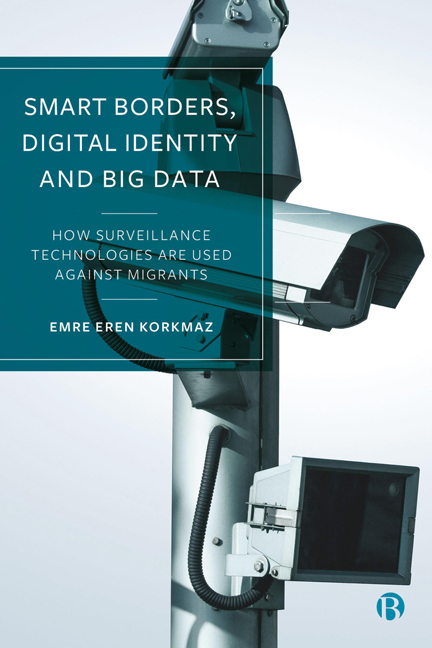 Smart Borders, Digital Identity and Big Data
Smart Borders, Digital Identity and Big Data Book contents
- Frontmatter
- Dedication
- Contents
- List of Abbreviations
- About the Author
- Acknowledgements
- Introduction: Canaries in the Coal Mine
- 1 Migration and (Surveillance) Capitalism
- 2 Migration and (Big) Data Analysis
- 3 Smart Borders
- 4 Digital Identity and Surveillance Capitalism
- Conclusion: How Can We Resist?
- Notes
- References
- Index
4 - Digital Identity and Surveillance Capitalism
Published online by Cambridge University Press: 27 March 2024
- Frontmatter
- Dedication
- Contents
- List of Abbreviations
- About the Author
- Acknowledgements
- Introduction: Canaries in the Coal Mine
- 1 Migration and (Surveillance) Capitalism
- 2 Migration and (Big) Data Analysis
- 3 Smart Borders
- 4 Digital Identity and Surveillance Capitalism
- Conclusion: How Can We Resist?
- Notes
- References
- Index
Summary
This book examines the role of migration and border management in understanding the process by which surveillance capitalism has become an intrinsic and fundamental component of contemporary capitalism, and discusses the reasons why many technological products are being tested on people on the move, as well as the potential ramifications. Up to this point, I have first discussed the concept of capitalism, followed by a discussion of its consequences in the fields of big-data analysis and smart borders. Now, I will take up a more complicated field. I will consider efforts for digital identity, or the digitalization of identity, in migration and border management.
The main reason why this is more complicated is that goals such as supporting migrants and refugees and contributing to their financial and social integration are at the forefront. Data analysis and smart borders, in particular, function to identify, track and, when necessary, stop people on the move, and decide and limit how far they are allowed to go. Basically, they are fields in which states and certain industries, such as border management and war technologies cooperate, with technology companies. Here, the lines are clearer. There might be people who view these tech products positively for reasons such as preventing migration movements, reinforcing national security and border security and fighting smugglers. Or, the ‘security-oriented’ approach in question may be rejected from a standpoint of migrant and refugee rights, human rights, the right to asylum and the right to live. Therefore, migration scholars are worried about practices in these fields, and the tragedy of the thousands of people on the move who lose their lives on the borders because of smart border applications.
However, the picture is different in the field of digital identity. There are, of course, academics who call attention to the corporate agenda-setting aspect of the field and criticize the entire process. However, a reformist approach is more dominant. The importance of issuing ID cards to people, digitalizing these IDs and providing people with ‘fast and efficient’ access to services thanks to digital IDs draws more attention.
- Type
- Chapter
- Information
- Smart Borders, Digital Identity and Big DataHow Surveillance Technologies Are Used Against Migrants, pp. 87 - 115Publisher: Bristol University PressPrint publication year: 2024
